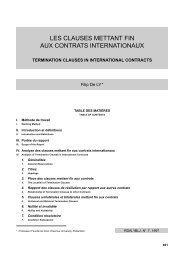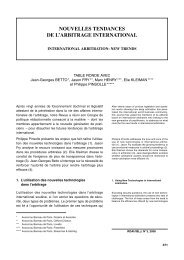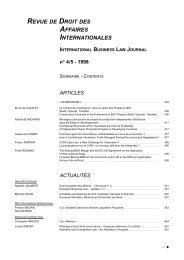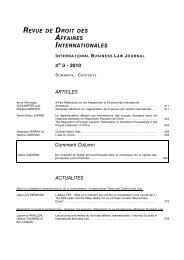ACTUALITES - Droit du commerce international et des affaires ...
ACTUALITES - Droit du commerce international et des affaires ...
ACTUALITES - Droit du commerce international et des affaires ...
Create successful ePaper yourself
Turn your PDF publications into a flip-book with our unique Google optimized e-Paper software.
DROIT DU COMMERCE INTERNATIONAL ET DE LA CONCURRENCEthe absence of d<strong>et</strong>errent fines, offenders would nothave the incentive: “to apply for immunity or afine re<strong>du</strong>ction under a leniency program, which mayseriously hamper cartel enforcement”.To achieve such adequate level of d<strong>et</strong>errence, theamount fined should exceed any potential gain thatmay be expected from the anticomp<strong>et</strong>itive behaviour.Following this general principle, the working grouprecommends the intro<strong>du</strong>ction of a maximum statutoryfine, which would be calculated on the offender’soverall consolidated turnover. However, the appropriatebasis for the calculation of fines would b<strong>et</strong>he value of sales to which the infringement relatesand an appropriate starting point for such calculationcould be a percentage of this value, reflecting its seriousness.Fines could be increased in order to ensureeffective d<strong>et</strong>errence, in particular where “the offender’sturnover is greatly superior to the sales to which the infringementrelates”.The working group provi<strong>des</strong> a non exhaustive listof adjustment factors in so far as the level of finestakes into consideration in particular the offender’srole in the infringement and his behaviour <strong>du</strong>ringthe investigation. In this respect, the ECA followsthe European Commission Guidelines. First of all,regarding aggravating circumstances, fines should beincreased for companies which played a leading orinstigating role, which coerced others to join it or tocontinue their participation therein. According to theEuropean Commission Guidelines, the level of finesmay be increased whenever companies obstruct thecomp<strong>et</strong>ition authority’s investigation, contrary to theirobligation to co-operate. Repeating infringements isalso included in the fine calculation in dominanceabuse cases.Regarding mitigating circumstances, the workinggroup takes into account the case law when it requiresthat no fine re<strong>du</strong>ction may be warranted forthe sole fact that an undertaking failed to approve expresslythe concerted behaviour or to attend all therelevant me<strong>et</strong>ings:“unless the con<strong>du</strong>ct of the undertaking concerneddeparted significantly and openly fromthe proposed course of action and its participationin the infringement is genuinely peripheral”.Moreover, with respect to the new Commission’s concernabout allowing damages to these infringements’victims, the working group intro<strong>du</strong>ces a fine re<strong>du</strong>ction.It applies if the offender takes active steps to mitigat<strong>et</strong>he adverse consequences of the infringement, i.e. byproviding voluntarily, timely and adequate compensationto those who have suffered damage as a resultof it.Or, sans <strong>des</strong> amen<strong>des</strong> dissuasives, les contrevenants neseraient pas incités : « à demander l’immunité, ou uneré<strong>du</strong>ction d’amende en application d’un programme declémence, ce qui pourrait sérieusement comprom<strong>et</strong>tre lalutte contre les cartels ».Pour assurer ce niveau de dissuasion, le montant<strong>des</strong> amen<strong>des</strong> devrait dès lors excéder tout gainpotentiellement atten<strong>du</strong> <strong>du</strong> comportement anticoncurrentiel.Suivant ce principe général, le groupe de travailrecommande d’intro<strong>du</strong>ire un plafond légal de l’amendequi soit fondé sur le chiffre d’<strong>affaires</strong> total consolidé del’entreprise contrevenante. Cependant, pour déterminerl’amende, la base de calcul appropriée serait la valeur <strong>des</strong>ventes affectées par les pratiques <strong>et</strong> le point de départde ce calcul pourrait être un pourcentage de c<strong>et</strong>te valeur,eu égard à leur gravité. Ces amen<strong>des</strong> pourraient êtremajorées afin d’assurer le caractère dissuasif, « notammentlorsque le chiffre d’<strong>affaires</strong> <strong>du</strong> contrevenant est largementsupérieur aux ventes affectées par la pratique ». 2Une liste non exhaustive de facteurs d’ajustement estofferte afin que le montant de l’amende tienne comptenotamment <strong>du</strong> rôle <strong>du</strong> contrevenant dans l’infraction<strong>et</strong> de son comportement au cours de l’enquête. Cefaisant, l’ECA 3 suit les lignes directrices de la Commissioneuropéenne. S’agissant tout d’abord <strong>des</strong> circonstancesaggravantes, les amen<strong>des</strong> devraient être majorées pour lesentreprises qui ont joué un rôle de leader ou d’instigateur <strong>du</strong>cartel, ou ont contraint d’autres entreprises à se joindre, ouà poursuivre leur participation à un cartel. Conformémentaux lignes directrices, le montant <strong>des</strong> amen<strong>des</strong> devrait êtreaugmenté lorsque les entreprises font obstruction àl’enquête de l’autorité de concurrence, en dépit de leurobligation de coopération. La réitération serait égalementsanctionnée en matière d’abus de position dominante.En matière de circonstances atténuantes, le groupe d<strong>et</strong>ravail suit la jurisprudence de la Cour, lorsqu’il demandequ’aucune ré<strong>du</strong>ction d’amende ne soit acquise <strong>du</strong> seulfait que l’entreprise n’a pas approuvé expressément lecomportement ayant fait l’obj<strong>et</strong> de la pratique concertée, oun’a pas assisté à toutes les réunions concernées :« sauf si le comportement de l’entreprise en cause s’estsignificativement <strong>et</strong> ouvertement écarté de la ligne decon<strong>du</strong>ite proposée, <strong>et</strong> que sa participation à l’entente estvéritablement accessoire ».De plus, conformément au souci actuel de la Commissionde voir les victimes de ces pratiques indemnisées, uneré<strong>du</strong>ction d’amende est proposée lorsque le contrevenantengage <strong>des</strong> actions concrètes afin d’atténuer lesconséquences négatives de ses pratiques, par exemple enfournissant aux victimes volontairement, <strong>et</strong> dans <strong>des</strong> délaisraisonnables, une compensation adéquate.200 © 2009 Thomson Reuters (Legal) Limited and Contributors









